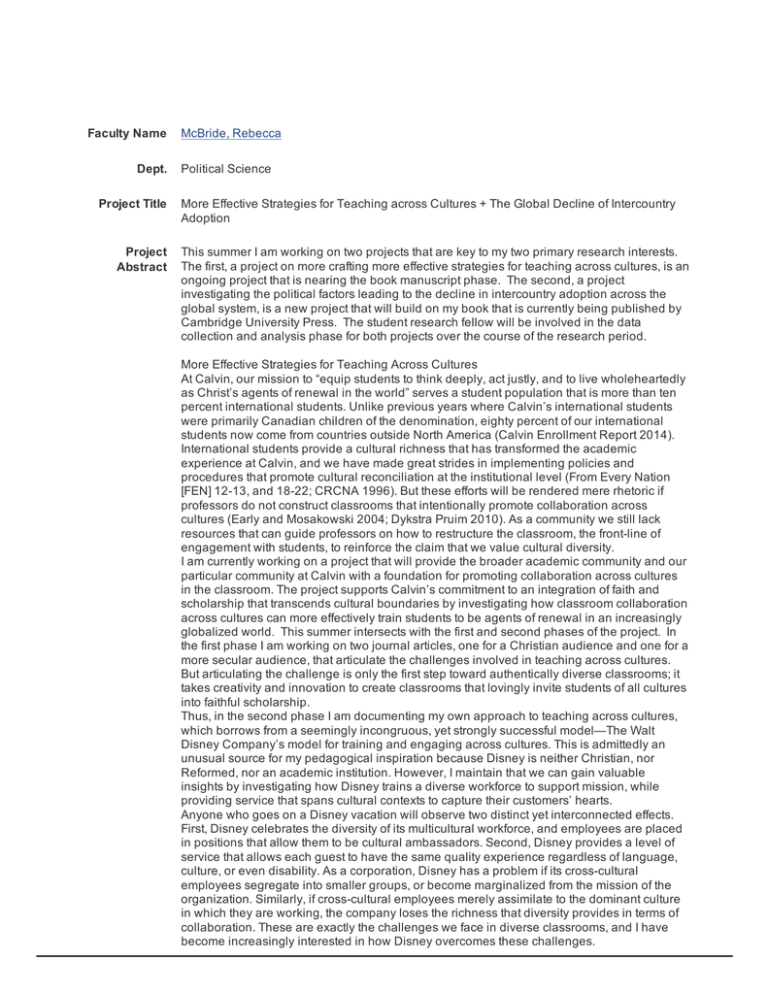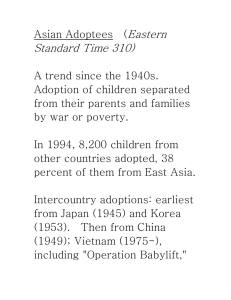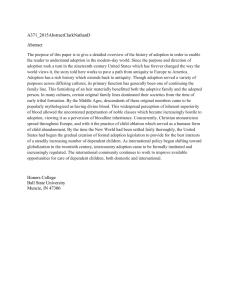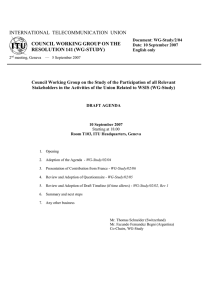iew
advertisement

iew Faculty Name Dept. Project Title Project Abstract McBride, Rebecca Political Science More Effective Strategies for Teaching across Cultures + The Global Decline of Intercountry Adoption This summer I am working on two projects that are key to my two primary research interests. The first, a project on more crafting more effective strategies for teaching across cultures, is an ongoing project that is nearing the book manuscript phase. The second, a project investigating the political factors leading to the decline in intercountry adoption across the global system, is a new project that will build on my book that is currently being published by Cambridge University Press. The student research fellow will be involved in the data collection and analysis phase for both projects over the course of the research period. More Effective Strategies for Teaching Across Cultures At Calvin, our mission to “equip students to think deeply, act justly, and to live wholeheartedly as Christ’s agents of renewal in the world” serves a student population that is more than ten percent international students. Unlike previous years where Calvin’s international students were primarily Canadian children of the denomination, eighty percent of our international students now come from countries outside North America (Calvin Enrollment Report 2014). International students provide a cultural richness that has transformed the academic experience at Calvin, and we have made great strides in implementing policies and procedures that promote cultural reconciliation at the institutional level (From Every Nation [FEN] 12­13, and 18­22; CRCNA 1996). But these efforts will be rendered mere rhetoric if professors do not construct classrooms that intentionally promote collaboration across cultures (Early and Mosakowski 2004; Dykstra Pruim 2010). As a community we still lack resources that can guide professors on how to restructure the classroom, the front­line of engagement with students, to reinforce the claim that we value cultural diversity. I am currently working on a project that will provide the broader academic community and our particular community at Calvin with a foundation for promoting collaboration across cultures in the classroom. The project supports Calvin’s commitment to an integration of faith and scholarship that transcends cultural boundaries by investigating how classroom collaboration across cultures can more effectively train students to be agents of renewal in an increasingly globalized world. This summer intersects with the first and second phases of the project. In the first phase I am working on two journal articles, one for a Christian audience and one for a more secular audience, that articulate the challenges involved in teaching across cultures. But articulating the challenge is only the first step toward authentically diverse classrooms; it takes creativity and innovation to create classrooms that lovingly invite students of all cultures into faithful scholarship. Thus, in the second phase I am documenting my own approach to teaching across cultures, which borrows from a seemingly incongruous, yet strongly successful model—The Walt Disney Company’s model for training and engaging across cultures. This is admittedly an unusual source for my pedagogical inspiration because Disney is neither Christian, nor Reformed, nor an academic institution. However, I maintain that we can gain valuable insights by investigating how Disney trains a diverse workforce to support mission, while providing service that spans cultural contexts to capture their customers’ hearts. Anyone who goes on a Disney vacation will observe two distinct yet interconnected effects. First, Disney celebrates the diversity of its multicultural workforce, and employees are placed in positions that allow them to be cultural ambassadors. Second, Disney provides a level of service that allows each guest to have the same quality experience regardless of language, culture, or even disability. As a corporation, Disney has a problem if its cross­cultural employees segregate into smaller groups, or become marginalized from the mission of the organization. Similarly, if cross­cultural employees merely assimilate to the dominant culture in which they are working, the company loses the richness that diversity provides in terms of collaboration. These are exactly the challenges we face in diverse classrooms, and I have become increasingly interested in how Disney overcomes these challenges. The student involved in this research project will be instrumental in helping me move from the collection phase to the writing phase. As such, the student will help fill small gaps in the literature review, help the faculty researcher bring together various components of the project that have been in process for the past 18 months, and be an integral part of the article submission process for multiple articles of varying types. The project provides the student with an opportunity to be involved in the research and publication process from beginning to end, which is an unprecedented opportunity to discern whether research is a career field that the student would like to pursue. The Global Decline of Intercountry Adoption US citizens have adopted more than 230,000 foreign­born children in the past decade. These children have crossed political, ethnic, social, and linguistic boundaries to migrate to new families in new states. As Christians, we should care about the factors that influence how states care for the most vulnerable of all citizens; we should care about protecting children without parental care. My earlier research investigated how adoption has become a global, interconnected phenomenon through state learning. I argued that intercountry adoption has spread through the international system because states have learned about intercountry adoption from two sources. First, they have learned from other states’ experience that intercountry adoption is an effective policy option; it can provide a solution to a domestic child welfare crisis. Second, states have learned from networks of adoption advocates that intercountry adoption is an accessible policy option; it is a solution they can easily initiate. This summer I am starting work on a new project which builds on my first book on the topic. Anyone who follows intercountry adoption trends will know that since 2010, we have seen a decline in intercountry adoption in two ways. First, the overall number of children who have been adopted across international borders has decreased. Second, the overall number of states which allow foreigners to adopt children have decreased in that same time period. It is this second trend that will be the focus of my next project. Ultimately I am interested in investigating whether we can identify the political factors that are increasingly influencing states to shut down their intercountry adoption programs that are already in progress. To start this new phase in my intercountry adoption research, I need to collect new data. My current dataset documents all state policies (including 144 countries) on intercountry adoption from 1941 to 2012. The bulk of the trends I am interested in explaining happen after this time period, from 2012 to current. This data collection is an ideal project for a student researcher because it is more than entering data into a spreadsheet; the task involves both investigative and analytical skills. Project Outcome The work done this summer will be used to produce at least one book chapter in the faculty researcher’s book on more effective pedagogy for teaching across cultures. Additionally, the data collected on intercountry adoption will be analyzed initially for a scholarly article in a political science journal. There is also potential that the article about the decline in intercountry adoption will become the foundation for another book­length project on the global politics of intercountry adoption. The McGregor Fellow will have a crucial role in the completion of these projects, and will be credited for his/her work on the project. When this work is presented at conferences, the faculty researcher is willing to facilitate McGregor Fellow participation in some of the presentations if it is an appropriate venue to do so. The project on teaching across cultures will be of value to many groups. First, the book coming out of this experience will produce innovative cross­disciplinary insights that will highlight how Calvin is an institution that fosters innovation and rewards creativity. The enthusiasm for this project beyond the Calvin community is encouraging, and Calvin has an opportunity to take the lead in an innovative approach to teaching across cultures. Second, the heart of the first project is the scholarship of teaching. Classrooms which more effectively encourage collaboration across cultures have an impact beyond facilitating better teaching; they build relationships that transform the student experience. Thus, this project has the potential to shape pedagogical approaches and transform student experiences within in our community and beyond. Third, this project allows the faculty researcher to strengthen one of her interests—mentoring students in research. Student research assistants ensure that I am effectively incorporating student perspectives into the project and using the project as an opportunity to mentor students in vital research skills. The project on the decline of intercountry adoption will also be an important contribution to political science scholarship on the politics of intercountry adoption. First, for the faculty researcher, this project will extend her research agenda and build upon previously published research. Second, this project will facilitate the publication of a journal article on intercountry adoption that will greatly add to our understanding on a phenomenon that is relatively understudied in international politics, the flow of children across borders. Third, once published this article will strengthen Calvin College’s contribution to international political research as well as research on intercountry adoption.



